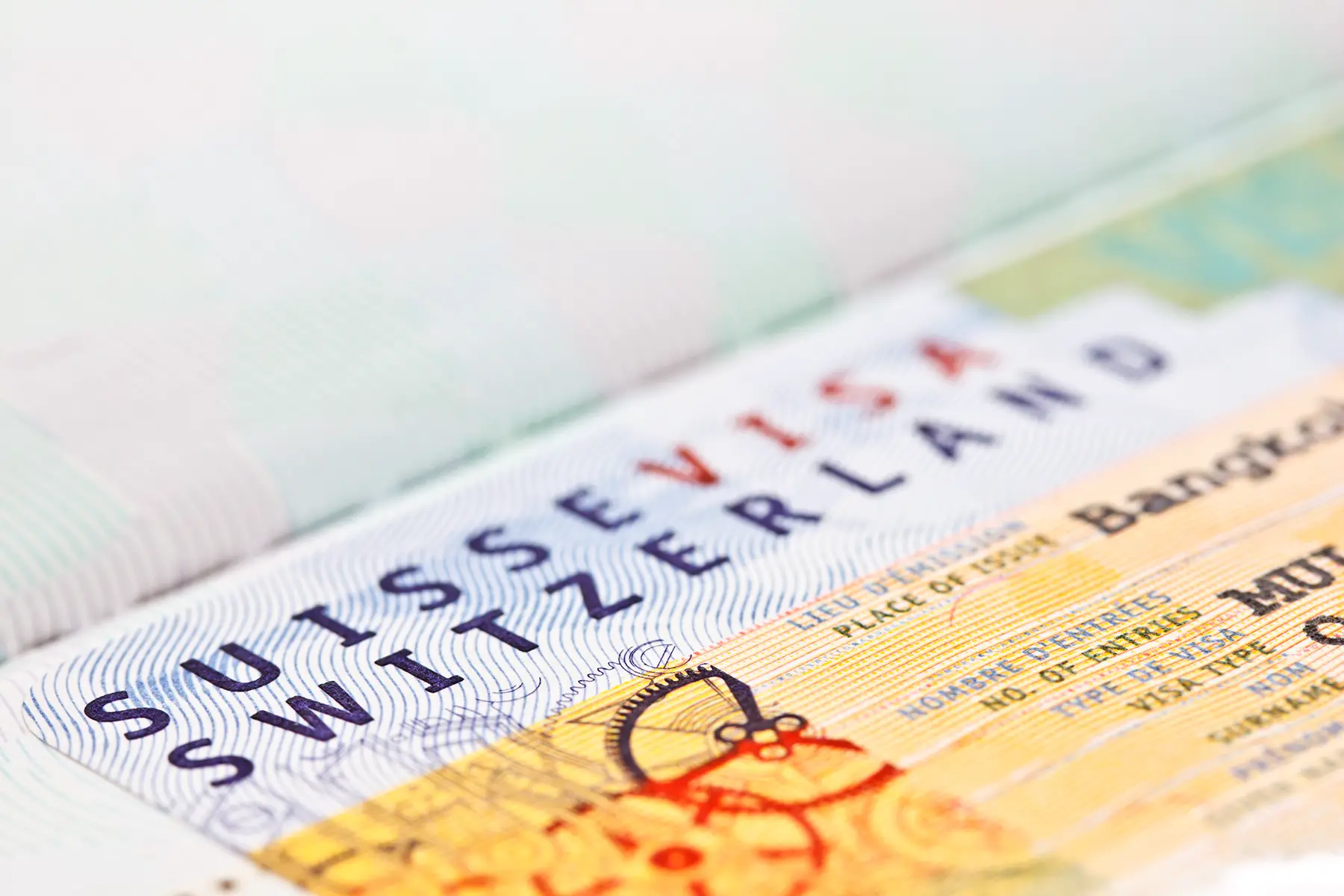Switzerland is a top destination for workers who cross a country border on their commute to work. There are many reasons why people choose to work there and live in another EU/EFTA country, such as family obligations or lowering their living costs.
Whatever your situation, you should be aware of the many regulations and options for cross-border workers in Switzerland.
Here’s what you need to know:
Resume.io
Trying to land the job that will take you on your next big adventure? Make sure your application is top of the pile with Resume.io's online resume builder. They provide resume templates, cover letter help, and more, making job applications effortless. Make it to the next round with Resume.io.
How to become a cross-border worker in Switzerland
Cross-border workers (frontaliers or grenzgänger) reside in another country in the European Union (EU) or European Free Trade Association (EFTA) and work in Switzerland. These workers, also called cross-border commuters or frontier workers, can be employed or self-employed with company headquarters in Switzerland. As a rule, the person must return to their main place of residence (abroad) at least once a week.

Approximately 20% of Switzerland’s foreign workers are cross-border commuters. They account for 6% of the total Swiss workforce and this trend is on the rise. Just over half are domiciled in France. However, Germany and Italy are also home to many people who work in Switzerland. Companies in the region of Lake Geneva employ the highest number of cross-border commuters.
To become a cross-border worker in Switzerland, you need a G-Permit from the cantonal authorities where you work. G-permits are usually valid for one year and are limited to the border zone of the issuing canton. Even EU/EFTA nationals require a permit to work in Switzerland.
The Swiss authorities will only issue non-EU/EFTA nationals a G-permit if they have a permanent residence permit in a neighboring country. The worker also must have lived in the neighboring country’s border zone for at least six months and fulfill the labor market requirements. Third-country border workers require permission to change jobs or occupations.
Taxes for cross-border workers in Switzerland
As a cross-border worker, your employer deducts your Swiss taxes from your salary. Switzerland has double-taxation agreements with more than 100 countries. This means that the Swiss tax at the source (withholding tax) is deducted from your tax liability in your country of residence.
Generally speaking, you’ll need to provide your country’s tax office with your Swiss salary statements. These serve as proof of payment of Swiss withholding tax. There are a few exceptions. For example, if you live in Germany but spend more than 60 nights per year in Switzerland for work-related reasons, the authorities consider you a Swiss tax resident and not a German tax resident. If you’re a French citizen and work in a canton other than Geneva, then the French authorities collect your taxes. On the other hand, if your place of employment is Geneva, you pay taxes in Switzerland.
Cross-border worker insurance requirements

Health insurance
Cross-border commuters must insure themselves against illness from the first day of their employment in Switzerland. Residents of France, Germany, Austria, and Italy can choose to be insured in their country of residence or in Switzerland. If you prefer to be insured in your country of residence, you have three months from the time you are issued your G-permit to submit an exemption request to the cantonal office where your workplace is located. Here are some additional rules and exceptions to know about:
- Residents of France require an exemption request to be signed by the Caisse primaire d’assurance-maladie (CPAM) in France before they submit the document to Swiss authorities.
- Non-EU/EFTA citizens must obtain compulsory Swiss health insurance as a G-Permit holder.
- EU/EFTA citizens who live in a non-neighboring EU/EFTA country must get insurance in Switzerland rather than their country of residence. Their unemployed dependents must also have Swiss health insurance.
If you live in an EU/EFTA country and have Swiss health insurance, you need to request the S1 form from your Swiss provider. You’ll submit this form to an insurance company in your country of residence. Once you’ve completed this step, you can get medical treatment both in your country of residence and in Switzerland.
If your household income is relatively low, you may be able to request a health insurance premium reduction. In many cantons, you have to contact the cantonal authorities to claim premium reductions. As a cross-border commuter, you will apply with the canton where you work.
Accident insurance
If your only workplace is in Switzerland, your employer has to pay for your occupational accident insurance. This way, your medical bills are covered if you’re injured in your workplace. If you work more than eight hours per week, your employer automatically takes out non-occupational accident insurance. This covers your costs outside of the workplace. For example, if you’re in an accident while commuting.
As a cross-border worker, you can choose to receive treatment in Switzerland or in your country of residence.
Social security and disability insurance
If you work in Switzerland, you must participate in the Swiss social security system: Old Age and Survivors Insurance (OASI). Your employer will make contributions from your salary. After you’ve contributed for 12 months, you are eligible for your OASI pension at the legal Swiss retirement age. Your Swiss pension is based on your salary and the duration of your employment in Switzerland.
In order to claim a disability pension, you have to work in Switzerland and participate in the obligatory DI scheme for at least three years prior to becoming disabled. However, citizens of EU/EFTA countries receive credit for their contributions to social disability insurance in EU or EFTA countries after one year of contributing in Switzerland.
Additional financial considerations for cross-border workers
Swiss employers usually expect you to have a bank account in Switzerland so that they can pay your salary. Many Swiss banks open accounts for cross-border workers, but most charge extra non-resident fees.

As a contributor to Swiss social security, you can also use Swiss private pension (third pillar) savings accounts or retirement funds. This can help you save more for retirement. The rules can vary based on the country of your main residence, however. It is best to contact a financial advisor who can help you with your specific situation.
Cross-border workers are legally able to buy a second home near their employer in Switzerland. You do not need to apply for a special permit for properties smaller than 1000 m2, but you can’t legally rent out the property or rooms. Furthermore, the Swiss mortgage rules are complex and it isn’t easy for a foreigner and non-resident to loan money from a Swiss bank.
Cross-border worker unemployment benefits
Generally speaking, only residents of Switzerland are entitled to Swiss unemployment benefits. That said, contributions for unemployment benefits are automatically deducted from your salary. In the case that you lose your job in Switzerland, you have to claim benefits from the unemployment office of your country of residence. This requires a PD-U1 form (in German) from the Swiss unemployment office and an international employment certificate from your former Swiss employer. Any previous employment in another EU/EFTA country will also count towards the eligibility requirement.
Partial unemployment happens when your employer reduces your work hours or the company ceases its activities. In this case, you can claim Swiss unemployment benefits.
Maternity and paternity leave
As a cross-border worker, you can take paid maternity or paternity leave in Switzerland. Women can claim maternity leave as long they have contributed to Swiss social security for nine months prior to the birth and have worked for at least five months during pregnancy. But keep in mind that you are ineligible if you have a job in your country of residence that accounts for more than 25% of your salary or workload.
At the birth of each child, fathers are entitled to two weeks of paid paternity leave from their work in Switzerland. The leave can be spread out or taken all at once, but the father must use the time off within six months of the child’s birth. Mothers can take 14 weeks of paid maternity leave.
Child benefits
If you’re employed in Switzerland, you are entitled to child benefits as long as your children live in an EU/EFTA country. Your Swiss employer issues the benefit with your salary. However, if your spouse/partner works in your family’s country of residence, you must claim child benefits there and are not entitled to Swiss child benefits.
If you receive child benefits in your country of residence and these are lower than Swiss child benefits, you can receive the difference from your Swiss family allowances scheme. You should apply for the benefit with your employer. Self-employed people should contact the family compensation fund.
Driving requirements for cross-border workers
In order to drive in Switzerland, you must pay the Swiss annual highway tax by purchasing a motorway vignette. The vignette costs CHF 40 and is valid for one year. You can buy it at Swiss post offices and at most gas stations and supermarkets.

As a cross-border driver, you must pay careful attention to customs regulations for vehicles or risk a hefty fine. Here are some rules to keep in mind:
- You can use a private car registered in the EU country to commute to your Swiss employer, but you cannot use the car to conduct your work.
- You must obtain a permit for your car from the Swiss customs office if you stay in Switzerland during the workweek and go home on weekends.
- If you receive a company car registered in Switzerland from your employer, you can use the car to commute but not for private use.
- If you are an EU resident, you should never borrow cars registered in Switzerland and drive them to EU countries. This is forbidden by EU customs regulations.
Useful resources
- Your Europe – official EU site with information on your legal rights and responsibilities as a cross-border worker
- Swiss State Secretariat for Migration – an official government guide with details on working in Switzerland
- G-permit – official rules for Switzerland’s cross-border worker permit






